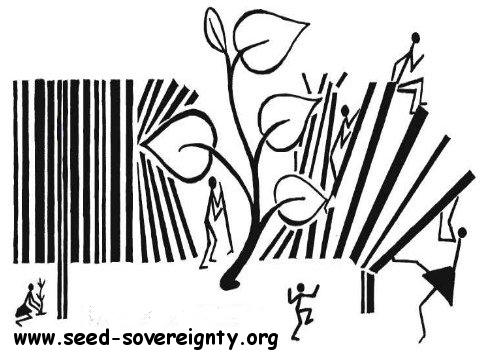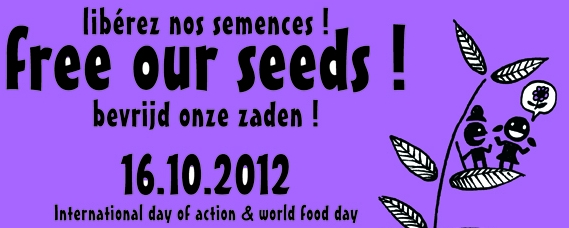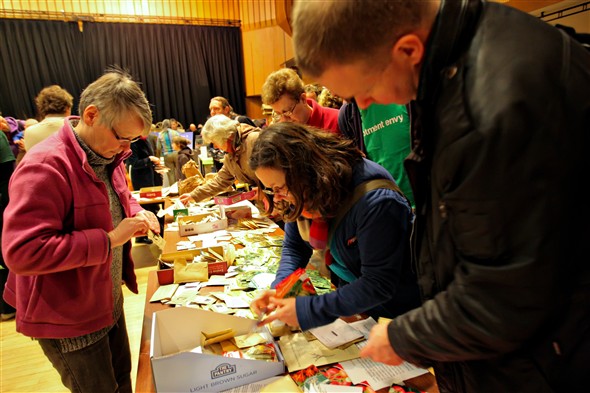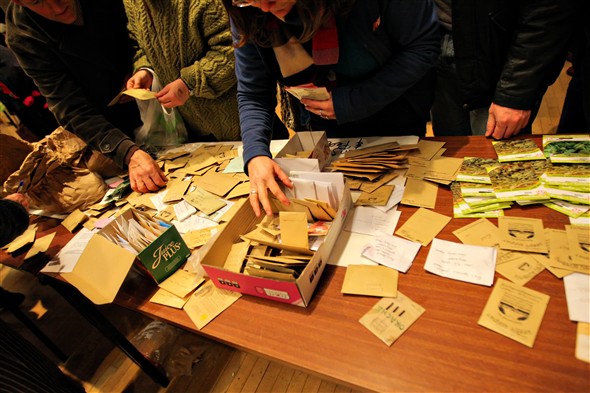
Campanie pentru Suveranitatea asupra Semințelor
Seeds must remain part of the Commons!
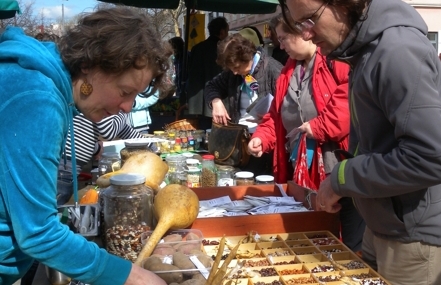
Diversitatea
semintelor în pericol! –
NU
vrem o lege europeanã în beneficiul industriei de
seminte!
Stimaţi
membri ai Comisiei,
Stimaţi membri ai
Parlamentului,
Stimaţi membri ai Consiliului,
O
nouã legislaţie privind seminţele este în
lucru la Bruxelles. Dacã planurile Directoratului General
pentru Sãnãtate şi Consumatori devin realitate,
sute de mii de varietãţi de fructe, legume şi
cereale vor dispãrea de pe piaţã. Toate aceste
varietãţi diverse ar urma sã fie împiedicate
de birocraţie, în timp ce puterea agriculturii
industriale va creşte.
Versiunile actuale disponibile ale
proiectului de lege promoveazã concentrarea pieţei de
seminţe doar în mâinile unui numãr
restrâns de corporaţii. Acest lucru este inacceptabil.
O nouã legislaţie privind seminţele ar trebui sã
permitã diversitatea seminţelor, potrivite pentru
agricultura la scarã micã şi pentru inovarea în
agricultura ecologicã. Seminţele trebuie sã fie
disponibile nu doar în bãncile de gene, dar şi
pe piaţa liberã, fãrã nicio restricţie
birocraticã.
În acest sens, vrem: NU înregistrãrii
obligatorii a seminţelor! Mai mult, criteriile curente de
înregistrare a varietãţilor trebuie reduse în
cazul varietãţilor destinate agriculturii organice în
virtutea diversitãţii sale. Agricultura trebuie sã
poatã rãmâne adaptabilã la schimbãrile
climatice, la noii paraziţi sau boli care se dezvoltã,
precum şi la noile metode de lucru prietenoase cu
mediul.
Niciuna dintre legile europene existente privind
seminţele sau propunerea de lege actualã nu au în
vedere aceste cerinţe. Aceste legi pun în pericol atât
diversitatea seminţelor, cât şi patrimoniul nostru
agricultural comun. Aceste legi ameninţã sistemul
alimentar sustenabil şi sãnãtos. Ele existã
doar pentru a servi intereselor industriei agrochimice.
Vã
solicitãm dumneavoastrã, membrilor Comisiei,
Parlamentului şi Consiliului Uniunii Europene, sã
respingeţi orice propunere care nu îndeplineşte
cerinţele menţionate mai sus! Nu dorim distrugerea
diversitãţii din agriculturã şi
horticulturã în Europa!
Pentru mai multe
informaţii, vã rugãm accesaţi:
-
Campania pentru Suveranitate Alimentarã:
www.seed-sovereignty.org
-
Blogul lui Patrick Wiebe: www.bifurcatedcarrots.eu/
Argumente:
Legislaţia
europeanã actualã privind seminţele îşi
are originea în vremea când protejarea mediului, a
naturii şi diversitatea biologicã erau subestimate.
Numeroase întreprinderi de ameliorarea plantelor au adus
atunci pe piaţã o diversitate de varietãţi.
Cele mai multe dintre acestea au putut fi reînsãmânţate
dupã recoltã, o tehnicã prezentã şi
practicatã de mii de ani, de-a lungul istoriei
agriculturii.
În anii 1980, s-au dezvoltat doi noi
termeni care sã defineascã ceea ce pânã
atunci era o practicã comunã: primul, “drepturile
ţãranilorµ şi, al doilea, varietãţi
“cu polenizare liberãµ (seminţele din care
se produce aceeaşi varietate în cazul în care nu
se încrucişeazã cu o varietate similarã).
Acest lucru s-a întâmplat din cauza schimbãrii
dramatice a pieţei de seminţe. Astãzi, cele mai
mari zece companii dominã trei pãtrimi din piaţa
globalã de seminţe, mai mult de jumãtate din
piaţa globalã provenind de la industria
agrochimicã.
Majoritatea varietãţilor sunt
subiectul unor restricţii tehnice şi legale care
submineazã recultivarea seminţei pãstrate şi
multiplicate de ţãrani. A fost introdus astfel acordul
oficial, necesar pentru ca o sãmânţã sã
intre pe piaţã, criteriile fiind adaptate pentru
varietãţile industriale. Productivitatea şi
populaţia globalã în creştere au fost
folosite drept argumente pentru aceste mãsuri. Totuşi,
Raportul multilateral întocmit de Evaluarea Internaţionalã
de Stiinţe Agricole şi Tehnologice pentru Dezvoltare
(IAASTD) ilustreazã instabilitatea acestei
abordãri.
Diversitatea recoltelor a dispãrut
masiv de pe piaţã. Acest lucru afecteazã
diversitatea varietãţilor neînregistrate, care,
în prezent, sunt schimbate sau comercializate de cetãţeni
europeni îndrãzneţi fãrã nicio
înregistrare. Astãzi, ne bazãm numai pe
experienţa şi expertiza valoroasã a acestor
oameni. Ar trebui sã încurajãm creşterea
numãrului lor, şi nu doar ca hobby, ci şi ca mod
de a trãi.
Un aspect secundar important este faptul cã
în agricultura ecologicã, datoritã
diversitãţii sale, nu au fost reproduse anumite
varietãţi în mod special. Totuşi,
agricultura organicã are nevoie de plante puternice fãrã
intervenţia pesticidelor. Acest lucru este posibil numai cu o
rezervã de gene naturale, larg rãspânditã.
Varietãţile acestea sunt, în genere, considerate
ca fiind inacceptabile pentru înregistrare sub criteriile
actuale ale întregistrãrii seminţelor.
Sign
up the petition!
Brighton
Corn Exchange
February 3, 10 a.m. - 4 p.m.
Web
– Twitter
Recaim
the Seeds Meeting (NL)
March 2-3
by
A Seed NL et. al.
Den
Bosch, Netherlands
Bonn
(D)
9. März 2013, 11-17 Uhr
Saatgut ist Kulturgut: Festival des Vereins zur Erhaltung der Nutzpflanzenvielfalt
Thurauen
(CH)
23./24. März 2013
Internationale Saatgut-Tauschbörse von Longo Mai und Pro Specie Rara
Peliti
International Seed Festival (HE)
May
11 - 13
Hello
everyone who cares about our seeds and our freedom to use,
exchange and sell them!
Take
action in the legislative process of EU-Seed regulation!
There
is urgent action needed to avoid damage by the upcoming new EU
regulation of seed marketing. The new regulation will de facto ban
old and rare varieties and farmers varieties and threaten the
exchange and selling of seeds of diversity.
DG SANCO (the
General Direction of the EU for Sanitary and Consumer affairs) has
been working on a proposal for a new regulation since years. On
Monday, the 6th of May they will present their proposal to the
conference of commissioners. They could not get a consensus of the
two other affected DGs, DG AGRI (agricultural affairs) and DG ENVI
(environmental affairs). Both opposed the last draft of the
proposal, and DG SANCO is not looking for a consensus.
The new
regulation has mainly been drafted by Isabelle Clement-Nissou, an
employee of GNIS, the French lobby of the Seed Industry. Madame
Clement-Nissou was sent as a national expert to Brussels by the
French government and is supposed to „support“ DG
SANCO. The drafts for the proposal became worse from the first to
the second draft; and it is expected that the final proposal is
going into the same direction.
Since there is no consensus
between the three DGs, the commissioners have to vote on the
proposal. If a majority of commissioners votes against the
proposal, it should be stopped. If they vote in favour, it will be
given to the EU Parliament and to the Council.
The seed
industry is pushing the legislation, because they’ve spent a
lot of money to influence the seed legislation. Furthermore, they
don't want it to be postponed after the election of a new
parliament in May 2014. They take the risk that the commissioners
vote against it – and we think: the commissioners should do
so! There is only a little chance to get a majority of
commissioners to vote against the current proposal, but we still
should try.
Each country of the EU has one commissioner in
Brussels, so we need 14 votes against the proposal. The
commissioners of DG AGRI and DG ENVI should vote against, so we
need 12 more.
Please write to the commissioner of your country
and convince him/her to vote „NO“ on the proposal of
DG SANCO on 6th of May.
The Austrian seed saving organisation
“Arche Noah” prepared a draft
letter that you could use as template,
if needed. Or write a better one!
You can find the members
of the current commission here.
Try
to make a link from his/her department to the seed issue, and try
to make clear to him/her that the proposal for a new EU seed
legislation will affect the cultural and biodiversity heritage of
your country and the freedom of farmers to use the seeds and the
varieties they want to.
NO
PROHIBITION OF SEEDS OF DIVERSITY!
Please
write to your commissioner in Brussels immediatelz.
He/she has to make a statement on the proposal from 24th of April
on, the sooner, the better. On the 6th of May, we must obtain at
least 14 objections, otherwise this proposal will become the
official proposal
In order to coordinate the action, please
tell us if you are going to approach your commissioner!
The Latest in the Battle to Reform EU Seed Laws (2013-02-24)

![]() ALERT:
Bad new EU-seed law ahead!
ALERT:
Bad new EU-seed law ahead!
The
DG SANCO (Directorate General for Health and Consumers) of the
EU-Commission is working on a revision of the EU Seed Laws,
currently a series of directives interpreted under national law,
to be replaced by a single regulation that will come into force
directly in all the 27 EU member states without local
interpretation. This would suit the needs of seed multinationals
which want uniform laws in all their markets, but would harm the
diverse structures of agriculture and the diverse use and
production of seeds. If you want to act on behalf of
seed-sovereignty, for farmers and seed-savers, you have to become
active in the coming months!
Diversity
under attack!
The
current draft of the proposed regulation, from Nov. 2012,
contains some draconian measures for farm-based production seeds,
and diversity of plant varieties. Farmers as seed producers would
be subject to the same obligations of registration and regulation
as multinational seed company operators. Varieties of
diversity and old varieties would be endangered, and the
free exchange of seeds and other propagation material could
effectively be forbidden. If varieties have to be registered and
to pass extensive testing, this would put up unreasonably high
barriers for farmers, consumers and the diversity in agriculture
and horticulture.
The European Seed Association, lobby
organisation of the seed multinationals, has two main aims. First
to control the niche markets and make them unattractive, and
second to register all producers of farm saved seed in order to
collect royalties from them. They are also trying to combine the
testing and evaluation for plant variety protection (PVP) and the
licensing for marketing, and to privatize the entire process. This
would hit the small companies and farmers, who would face
increasing and unreasonable testing and evaluation costs, for each
single variety of seed they wish to use.
What‘s
next?
The
current draft regulation was written by DG SANCO. Before it
becomes an official proposal of the EU-Commission, DG AGRI
(Directorate General of Agriculture and Rural Development) and the
DG ENVI (Directorate General for the Environment) have to agree to
it‘s contents. At the moment there are several points of
disagreement.
This opens a window we should use to struggle for
more diversity, for open pollinated varieties (versus ”hybrid”
varieties), and for more diverse seeds in the hands of farmers,
gardeners and seed savers.
Our demands for a new EU seed law:
•No regulation of seed exchange by seed savers and farmers!
•No mandatory registration or certification for open pollinated varieties!
“From
seed to seed” -
An educational film on the production of seeds
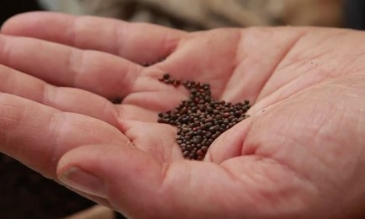 The
film is intended for all those interested in seed production -
beginners, amateur gardeners, farmers, vocational colleges,
children, those who wish to contribute to the conservation of
plant diversity, those for whom it is urgent to grow their own
seeds in order to adapt to different climate conditions or for
food security
The
film is intended for all those interested in seed production -
beginners, amateur gardeners, farmers, vocational colleges,
children, those who wish to contribute to the conservation of
plant diversity, those for whom it is urgent to grow their own
seeds in order to adapt to different climate conditions or for
food security
read
more...
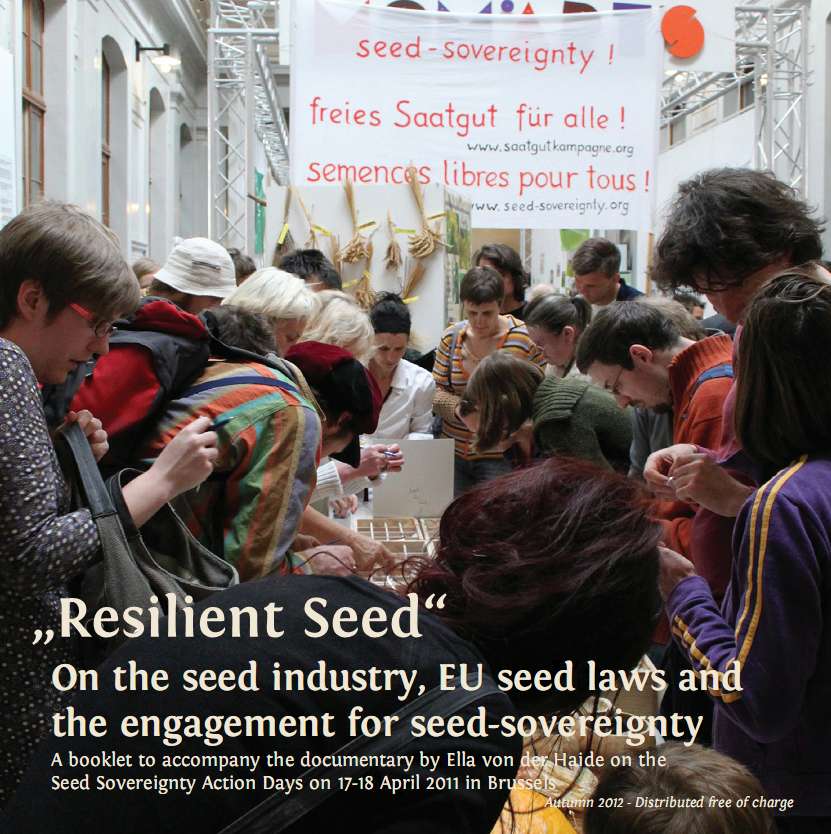 Resilient
Seed
Resilient
Seed
On the seed industry,
EU seed laws and the engagement for seed-sovereignty
„Resilient
Seed“ - the booklet
chap.
1.: Get informed and take action!
chap. 2.: The power of seed
and agrochemical companies
chap. 3.: Seed marketing law
chap.
4.; Seed law in 2012 at a crossroads
chap. 5.: Plant variety
protection (PVP) and UPOV
chap. 6.: Patents on plants
chap.
7.: How to organise a seed swap
Commission of the EU released drafts for new seed law
In
the first weeks of November the Commission of the EU has released
drafts for new
regulations
of the seed sector:
- „Draft
on plant reproductive materials”
-
„Draft
paper on plant health”
-
„Draft
paper on a proposal on official controls”
Resilient
Seed
On the seed industry,
EU seed laws and the engagement for seed-sovereignty
„Resilient
Seed“ - the booklet
chap.
1.: Get informed and take action!
chap. 2.: The power of seed
and agrochemical companies
chap. 3.: Seed law = seed marketing
law
chap. 4.; Seed law in 2012 at a crossroads
chap. 5.:
Plant variety protection (PVP) and UPOV
chap. 6.: Patents on
plants
chap. 7.: How to organise a seed swap
Call
to Action for Seed Sovereignty on 16 October 2012:
We
need seed sovereignty
to be able to
achieve food sovereignty!
Our demands are:
open access to fertile and diverse seeds free of any form of legal protection or patenting;
the right for farmers and gardeners to obtain seeds from their harvest, to re-sow, distribute and sell them;
a new model of agriculture based on local, small-scale food webs rather than monocultures requiring high inputs;
new agricultural and trade policies promoting production for local needs and not global “free” trade, dominated by transnational corporations;
policies that favour the needs of farmers and consumers, health and the environment instead of profits for big business.
The
European Court of Justice's decision reconfirms the interdiction
of seed trade:
Diversity of Cultivated Varieties
still endangered
The European Court of Justice stated the validity of current EU legislation on seed commerce by its judgement on 12th of July. Thereby it rejected the fundamental critics uttered beforehand by Advocate General Kokott. Accordingly, the existing trade embargo for seeds from non-registered varieties remains untouched. This is a defeat for the agricultural biodiversity and the ones who dedicate themselves to self-determined agriculture and gardening.
Andreas Riekeberg from the campaign for seed-sovereignty says: „It is an annoying judgement far from the reality. The court solely has reconfirmed the current EU legislation without taking into account the detailed critic by Advocate General Kokott, which pointed out the ongoing destruction of biodiversity on the fields and in the gardens driven by the respective directives. This is a slap in the face of those concerned with agricultural diversity. The judgement keeps going on promoting the seed industry and their uniform varieties which only grow with the help of chemical inputs, be it pesticides or fertilizers.“
Jürgen Holzapfel lives on the farm Ulenkrug in Mecklenburg-Vorpommern, Germany. He is a cultivator of old cereal varieties and saves his own seeds. He says: „I would have to tell the authorities about all the varieties of seeds which I save, even if I use them just for myself. To commercialize them, I would need to register them as conservation varieties, pay the fees and bear in mind not to exceed a certain quantity. I would even have to arrange with other farmers not to exceed the maximum threshold for a specific variety in a specific region. The court claims in the official press release to ensure the protection of plant genetic resources by this provision. This is just not true.“
The objectives of the campaign for seed-sovereignty are described by Anne Schweigler: „We will continue to struggle for the common right of all farmers and gardeners to decide for themselves which variety to cultivate. We will keep on organizing seed swaps and enhancing regional and international networks. The production of food and our alimentation have to be self-determined and must not be controlled by the agro-industry.“
The campaign for seed-sovereignty criticizes the policy of conserving the biodiversity stretched into a dwarfish frame by the EU directive. This in turn shall impede the emergence of a market of regional farm-saved seeds, e. g. for vegetables, cereals and seed oil as an alternative to the industrial market. Today, the European Court of Justice follows the legislative in its attempt to; „ … preventing the emergence of a parallel market for such seed, which was likely to constitute an impediment to the internal market for seed of vegetable varieties “. As written in the court's press release. It could have interfered with the business of the market-dominating corporations.
The campaign for seed-sovereignty is in line with the majority of seed saving initiatives in Europe, saying that the conservation directive is an impediment to the sustainment of biodiversity, which is luckily hardly applicable in reality. However, seed savers can be subject to prosecution when their work is disturbing the corporations.
The legal dispute between the seed saving initiative Kokopelli and the corporation Graines Beaumaux challenged the validity of current EU law and was brought to the European Court of Justice. The opinion of Advocate General Kokott on January 1st 2012 gave rise to hope that the restrictive EU directives could be dismissed.
Principally, only registered seeds may be traded within the EU. What was once meant to guarantee their quality, has evolved into a strong limitation of the diversity of seeds. Many old varieties have disappeared from the gardens and the shelves in the stores, either because they do not meet the catalogues constraints or their registration cannot be afforded by small farmers or initiatives.
Within the last 30 years a tremendous concentration on the seed market has been observed. A few transnational corporations comprise 65% to 80% of the share, depending on the crop and the region of the world. This was crucial to the accelerated destruction of biodiversity. Not until recent years (2008 - 2010), has the EU adopted three directives on conservation varieties. However, the activity of seed saving farmers and gardeners is limited due to the admission procedure and the restrictions of produced quantity.
Opinion
of the Advocate General (19.01.2012):
http://curia.europa.eu/juris/document/document.jsf?text=&docid=118143&pageIndex=0&doclang=EN&mode=req&dir=&occ=first&part=1&cid=66802
Press release of the European Court of Justice (12.07.2012): http://curia.europa.eu/jcms/jcms/P_89305/
Decision C-59/11 of the EJC: http://curia.europa.eu/juris/document/document.jsf?text=&docid=125002&pageIndex=0&doclang=EN&mode=lst&dir=&occ=first&part=1&cid=43979
(Translation of the press release of the Campaign for Seed Sovereignty from 12.07.2012)
Kampagne für Saatgut-Souveränität (auf Deutsch, 12/072012)
Kokopelli (en Française, 12/07/2012)
New EU Seed Law: “all power to the multinationals”
By
Erik D'haese
March 24th, 2012 (MO * magazine, Belgium
06-12-2011) -The European Union is working on a new legislation
for seeds. Earlier this year a Stakeholder Consultation was
organised. There are, however, quite a few comments to make about
the way this consultation happened. There is also the question of
whether the law which emerges will present a sensible answer to
the problems agriculture and the food system are currently facing.
UN Special Rapporteur on the Right to Food, Olivier De Schutter
doesn't seem convinced that it will.
Full
text
![]()
Days of action in Portugal - report:
 17./18.
April:Day of action in Poland – more than 100 events for the
preserving of seeds:
17./18.
April:Day of action in Poland – more than 100 events for the
preserving of seeds: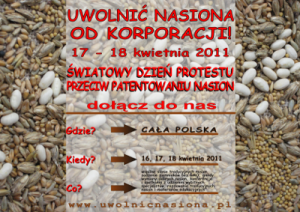
Seed Sovereignty is the basis for Food Sovereignty!
On October, 16th, there will be the World Food Day. The Forum for Food Sovereignty Nyeleni- Europe”, which met in August in Krems/Austria in August, calls for decentral actions during the week prior to October, 16th.
We, the Seed Campaign, understand ourselves as a part of the actions and the movements for food sovereignty.
We demand:
the right to obtain seeds from our own harvest, to re-sow, distribute and sell them;
the promotion of diversity in all regions by supporting conservers and breeders of varieties that can be re-sown;
the prohibition of genetic modofication technologies in agriculture;
the prohibition, without exceptions, of patents on plants and animals, their traits and genes, as well as patents on breeding methods;
a new agrarian policy, which, instead of supporting energy-intensive industrial production and monocultures, promotes biodiverse and ecological production.
Because of the October, 16th, we publish a message from Oliver de Schutter, the United Nations' Special Rapporteur on the right to food, in solidarity with these worldwide struggles for food souvereignty. He sent this video-message to the Seed Campaign (and the European Civic Forum, as one of the initiators of the campaign) on the occasion of the Seed Action Days in April in Brussels.
Oliver de Schutter covers the issue of seed policies on the relationship between access to seeds and the Right to Food. He focuses on the developing countries and the consequences for peasants of the European and global seed legislations.
Read the text of the video message in English
Watch the video message online (French with English subtitles)
Download the video (70 MB!)
Free our seeds!
International
Days of Action
Brussels, 17-18 April 2011
First European Seed Swap with participants from across Europe and beyond.
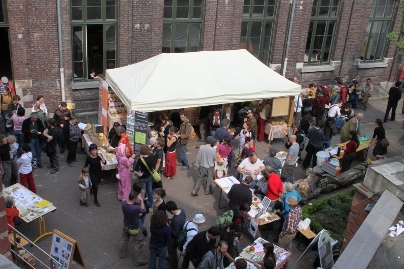
Sunday,
April 17th in Brussels organizations from ten European countries
offered heritage seeds for free or trade. Traditionally farmers
trade seeds, but this practice has largely been lost in Western
Europe, in favor of the industrial model of modern agriculture.
Hundreds of seed varieties were displayed on tables, with growers
and visitors deeply engaged in conversation. The seed swap took
place on the day peasant farmers organization La Via Campesina
designated as a worldwide day of action.
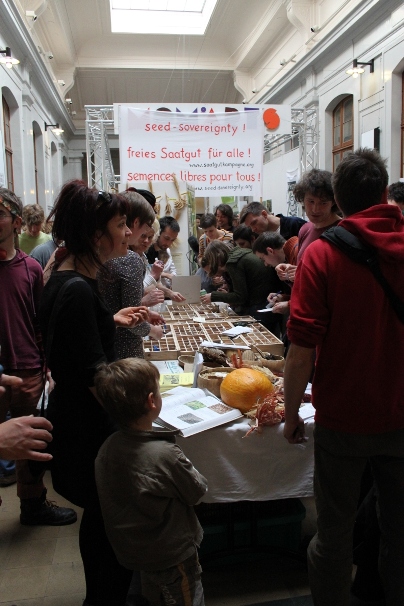 “There
have been seed swaps in different European countries, but this is
the first one at the European level”, says the German,
Jürgen Holzapfel, co-organiser of the event and himself a
farmer involved in conserving traditional wheat varieties. “Seed
swaps are an important contribution to conserving agricultural
biodiversity.”
“There
have been seed swaps in different European countries, but this is
the first one at the European level”, says the German,
Jürgen Holzapfel, co-organiser of the event and himself a
farmer involved in conserving traditional wheat varieties. “Seed
swaps are an important contribution to conserving agricultural
biodiversity.”
“Seed is has always been the foundation of food sovereignty in Poland”, said Maciek Pilarski, coordinator of the International Coalition to Protect the Polish Countryside from Stryszow. “In Poland, there are 1.5 million small scale farmers, who could play an important role in conserving old varieties.”
“In the Turkish language the importance of seed is made evident in that only those who produce seed are called farmers. The others are called ‘guardians of the field’”, relates Abdullah Aysu, president of the Turkish Confederation of Farmers (Çiftçi Sen) which represents 40,000 small farmers. Çiftçi Sen is a member of Via Campesina and therefore participates in the Brussels seed swap.
The
seed swap took place as part of the seed action days, organized by
the international campaign “Sowing the Future, Harvesting
Diversity” (www.seed-sovereignty.org). As part of the action
days, a petition will be handed over to the European Parliament on
Monday. The petition, signed by more than 50 000 people in 20
countries, protests against planned reforms in EU legislation
which would make swapping and distributing seeds of traditional
varieties much more difficult.
During a colorful and good natured march, dubbed the 'Anti Lobby Tour', more than 58,000 signatures were submitted to the EU parliament.
On Monday, April 18th, the second day of the international days of action for seed sovereignty, a large demonstration marched through the EU district of Brussels. On this Anti Lobby Tour, in front of the Bayer agrochemical and seed company building, a petition with more than 58,000 signatories was handed over to three Members of the European Parliament.
Jürgen
Holzapfel stressed the demands of the seed campaign: "We
insist on the right to resow seeds from our own harvest for
purpose of propagation and further distribution. Furthermore, we
wish to see support of locally adapted varieties by promotion of
conservation of heritage varieties and breeding improved varieties
for organic and bio-diverse agriculture. We demand a new method of
seed certification, which excludes GMO or chemical and energy
intensive varieties."
In
reply to the handover of the signatures, Vice President of the EU
Parliament and Belgian MEP Isabelle Durant referred to the
demonstrators as a vanguard that would continue to address
important issues. She demanded this happen at all levels both
within the EU and in member states. Together with their
parliamentary colleagues Marc Tarabella and Kriton Arsenis, she
took the signatures in three wheelbarrows to the European
Parliament building. During the handover, MEP Tarabella called for
a full inquiry into the consequences of proposed EU seed
legislation reform.
Other stops brought the Anti Lobby Tour to the European Seed Association (ESA) building, the lobbying organization for the European seed industry, and to the DG General Research of the European Commission. Both of whom promote the use of industrial and genetically modified seeds.
After entertaining plays and speeches from representatives of Turkey and India on the impact of the EU seed law on small farmers, the demonstration concluded at the Place du Luxembourg square.
"The action days were a great success!" said Anne Schweigler, one of the organizers, “I'm very optimistic about the future. The enthusiasm and interest of the many people in the seed-swap, and the critical mass here today of many dedicated people of different backgrounds has strengthened hope in all of us. Here we've shown concrete and workable alternatives to the process of privatizing all areas of life and the living."
WORLD CAFÉ on SEED SOVEREIGNTY
More than 40 members from 17 Organisations of 12 European countries took part in the World Café in Brussels on 18/04/2011
from
Austria/Germany:
Arche
Noah
from
Belgium:
Jardin
des collines
AEFJN
(Af.-Eu.-Net)
from
Danmark:
Danish
Seed Savers
from France/Suisse/Germany: Europ. Civic Forum
from
Germany:
BUKO-Campaign
against Biopiracy
JANUN
VEN
IG
Saatgut
from
Great Britain:
Seedy
Sunday
GM free Cymru
from
Greece:
Peliti
from
Ireland:
Irish
seed savers association
from
Luxembourg:
Radio
Ara
from
Poland:
ICPPC
from
the Netherlands:
ASEED
Bifurcated
Carrots
Supporter of the international days of action
from Belgium:
Nature
& Progrès
Le Début des Haricots
Rencontre
des Continents
MAP
Quinoa
Réseau des GASAP
Les
amis de la terre
Kokopelli
FIAN Belgium
Le Centre
liégeois du Beau Mur
La ferme du Hayon
Mouvement des
objecteurs de croissance
La Bande de Gasath
Collectif
123
SOS Faim
Associations 21
ADG
Oxfam
Solidarité
FUGEA
Terre & conscience
Collectif
Artivist
Reclaim The Fields
CITY MINE(D) –
BRXL
Grappe
magasins du monde OXFAM
Comité pour le
respect des droits humains "Daniel Gillard"
Maison
des Cultures et de la Cohésion
Sociale
Wervel
klorofil
okno
Les Jardins de
Pomones
Tuinbouwbedrijf Akelei
les Vers Tiges au Balcon
from Europe
Invitation to the action days in Brussels
La
Via Campesina, 16.3.2011:
BALI
SEED DECLARATION
Peasant
Seeds: Dignity, Culture and Life. Farmers in Resistance to Defend
their Right to Peasant Seeds
Let‘s meet in Brussels!
Program:
Tens of thousands of people throughout Europe are actively demanding that the right to produce seeds remains in the hands of small farmers and gardeners. A diversity of crops has nourished mankind for thousands of years. Seeds that we have inherited from past generations are the basis of life and are essential for food sovereignty.
The big seed trusts are determined to obtain worldwide control. This has been made clear by genetic engineering, patents on plants and animals, the introduction of seed reproduction fees… Add to that terminator technology that destroys the fertility of seeds and the prohibition of peasant varieties. We must prevent the very basis of our food supply from becoming a source of profit for multinational companies.
Two years ago we launched the petition „Sowing the future-harvesting diversity“ to protest against planned new European Union seed laws that are dominated by the interests of the big seed companies.
We intend to present the tens of thousands of signatures collected throughout Europe to the European Parliament and call for an enquiry to clarify whether these laws violate the fundamental right to food and to access to seeds.
We invite you to participate in two days of action during which we will make clear our opposition to EU policies and our intention to resist against them.
Come to Brussels! We are not prepared to accept that the basis of our livelihood is handed over to multinationals. In the future we intend to maintain and pass on the heritage of our plant varieties.
The main event will take place on 17 April, the day of international peasant resistance declared by Via Campesina, followed by a demon-stration on the 18th.
If you cannot come to Brussels, organise similar events in your countries, cities and villages!
Sunday,
17 April 2011
11.00 -18.00 „Maison des Cultures et de la cohésion sociale de Molenbeek-Saint-Jean”, Chaussée de Merchtem 67, 1080 Molenbeek-Saint-Jean
International
Seed Swap and
multilingual exhibition on seeds
Through this seed swap we want to draw public attention to a practice that has become increasingly widespread throughout Europe over the past few years and that could be made illegal by the planned EU laws.
16.00
-19.00 Molenbeek Cultural Centre
Conference
with presentations and debate
„Access to seeds is a
human right“
Activists from India, Turkey and several European countries will describe the situation concerning seeds in their countries and the consequences of the planned EU laws.
19.00
– 24.00 Molenbeek Cultural Centre
Music and films, dance and demo workshop
„popular kitchen” of the „collectif du 123”
Monday
18 April 2011
10.00 -13.00 „Mundo B”, Rue d'Edimbourg 26, 1050 Bruxelles
World-Café
Getting to know each other, exchange of experience and knowledge, discussions on collective work on seeds and the maintaining and multiplication of plant and crop diversity in gardens and fields.
15.00
-17.00 Demonstration
Demonstration to the Brussels offices of seed companies and their lobby organisations
Please contact us if you want to take part in these events and in the growing resistance against the monopolisation and privatisation of seeds !
Seedy Sunday 2010 in Brighton:
Photos by Dan Johnson Photography
Grassroots Seed Activism in the UK, by Debbie Greenfield, Chair, Seedy Sunday Brighton
Invitation to a
seed swap and exchange of know-how
Brussels, Sunday 17 April 2011
Within the framework of two days of action, an international seed swap will be organised with the aim of circulating all kinds of hardy and reproducible seeds and exchanging information, experiences and know-how on the production of seeds.
This event will bring together many initiatives which already exist in various countries. It will give them an occasion to present their activities and to establish links between us. This has become all the more urgent in view of the fact that European and international laws and regulations, either already in force or in preparation, could very well hinder or even prohibit such seed swaps.
Our main objective is to encourage the practice by farmers, amateur and professional gardeners of exchanging and giving seeds. This ancient tradition could be adopted by all people who are aware of the loss of diversity of varieties and of the risk posed by the growing privatisation of life-forms. We are witnessing a serious erosion of theoretical and practical knowledge. We want to look at ways of drawing attention to this danger and of passing this know-how on to a wider public.
To achieve this, we must use all means at our disposal!
Bring whatever you can that you think is appropriate to this event : seeds, exhibitions, slide shows, brochures, documents, films… Proposals for workshops (production and extraction of seeds, awareness building on gardening and agriculture…) or exhibits (vegetables, fruit, seeds, cereals or other collections of biodiversity…) will be welcome. Help us to awaken all our senses!
During the morning of Monday 18 April there will be time for meetings and discussions between all those interested in getting to know each other better. We would like to imagine together how experience and know-how concerning seeds can be passed on. Do you have training or pedagogical tools or methods which could be shared by others? In your opinion what would it be important to develop and in what form? Would you be ready to participate in the elaboration of such tools? Do you want to suggest other subjects for discussion on Monday morning?
Practical aspects
For the seed swap, send us an exact list of what you need: space, tables, electricity, exhibition panels… If you cannot take part, you could send seeds that you are ready to share with us. The more seeds there are, the more diversity will be distributed. We ask you only to bring naturally produced reproducible varieties (no F1 or F2, GMOs, GMPs) with no risk of unintentional crossbreeds between varieties.
We will send you a more detailed program once it is available.
By
nature seeds are nomadic,
let us help them to travel!
Longo Maï Seed-exhibition and excange in Païs Alp 2009, Provençe:
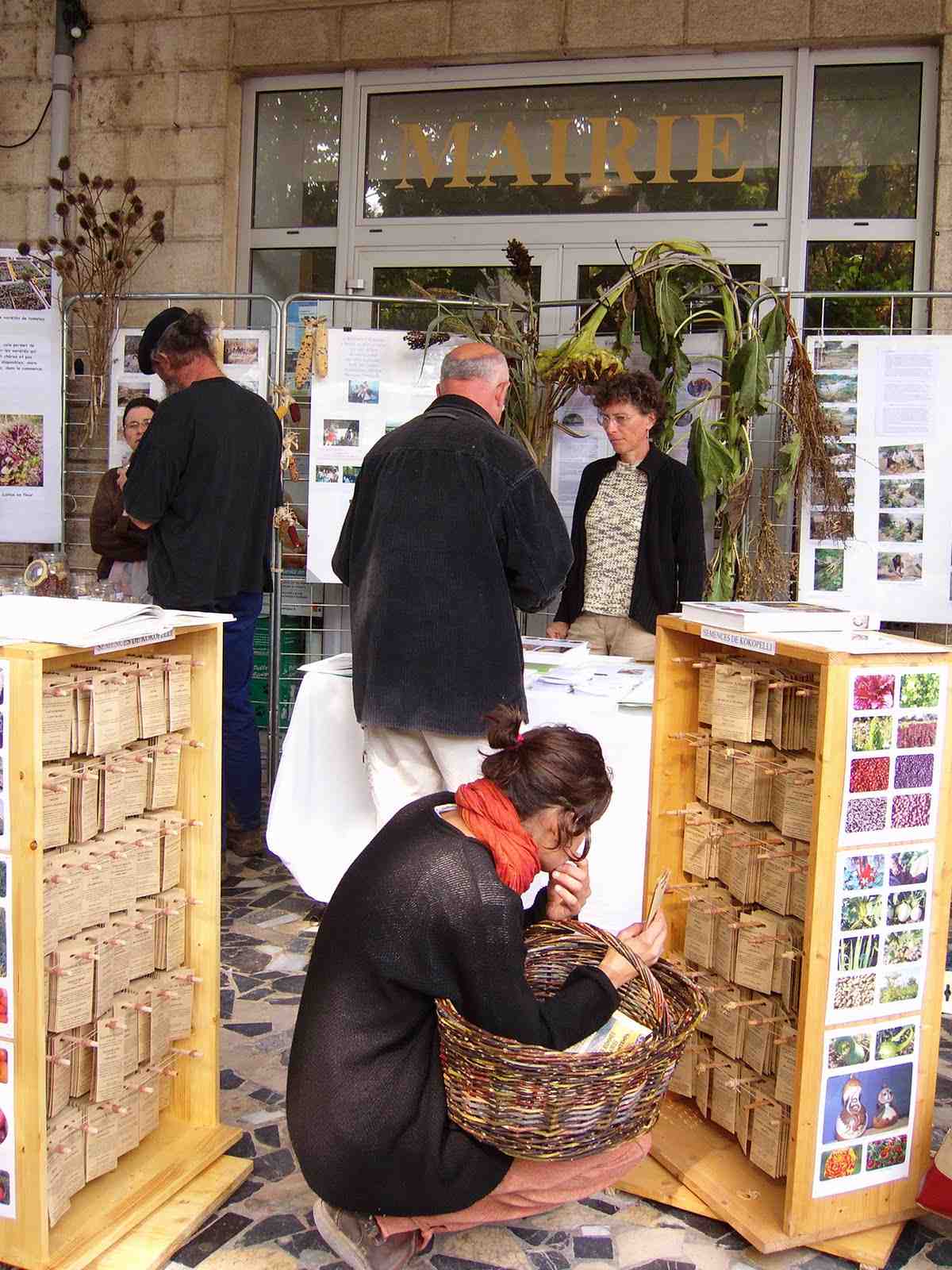
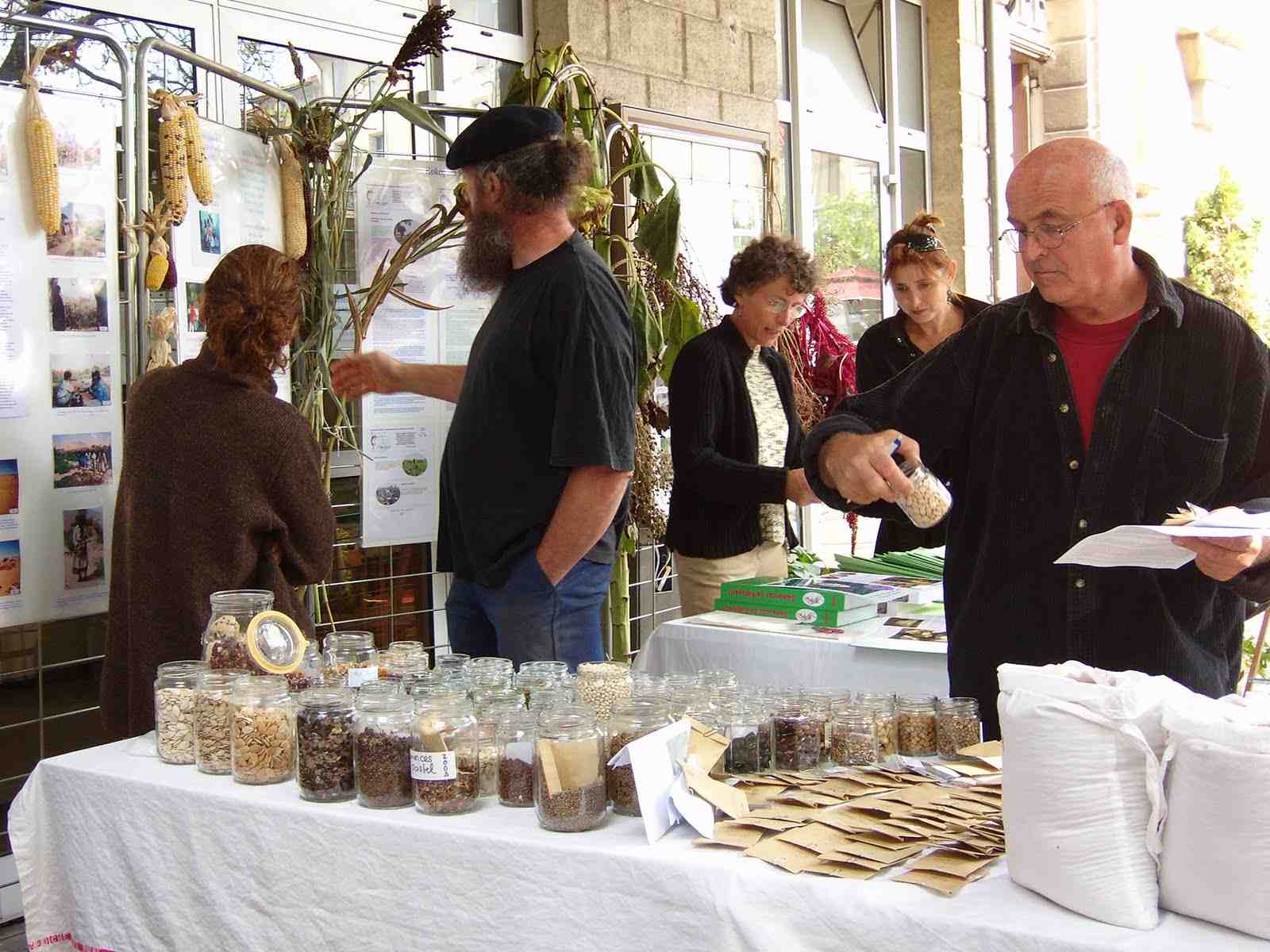
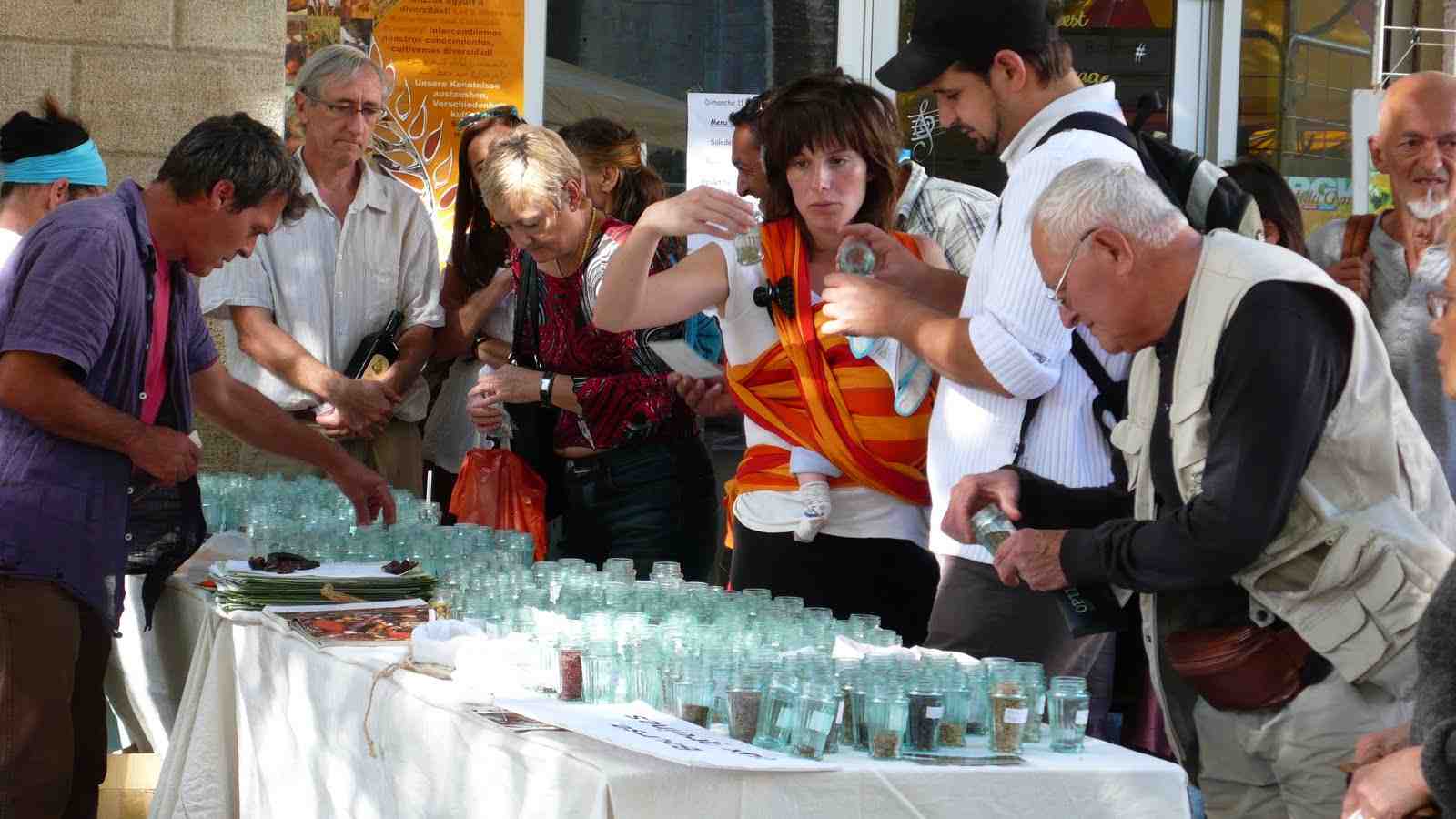
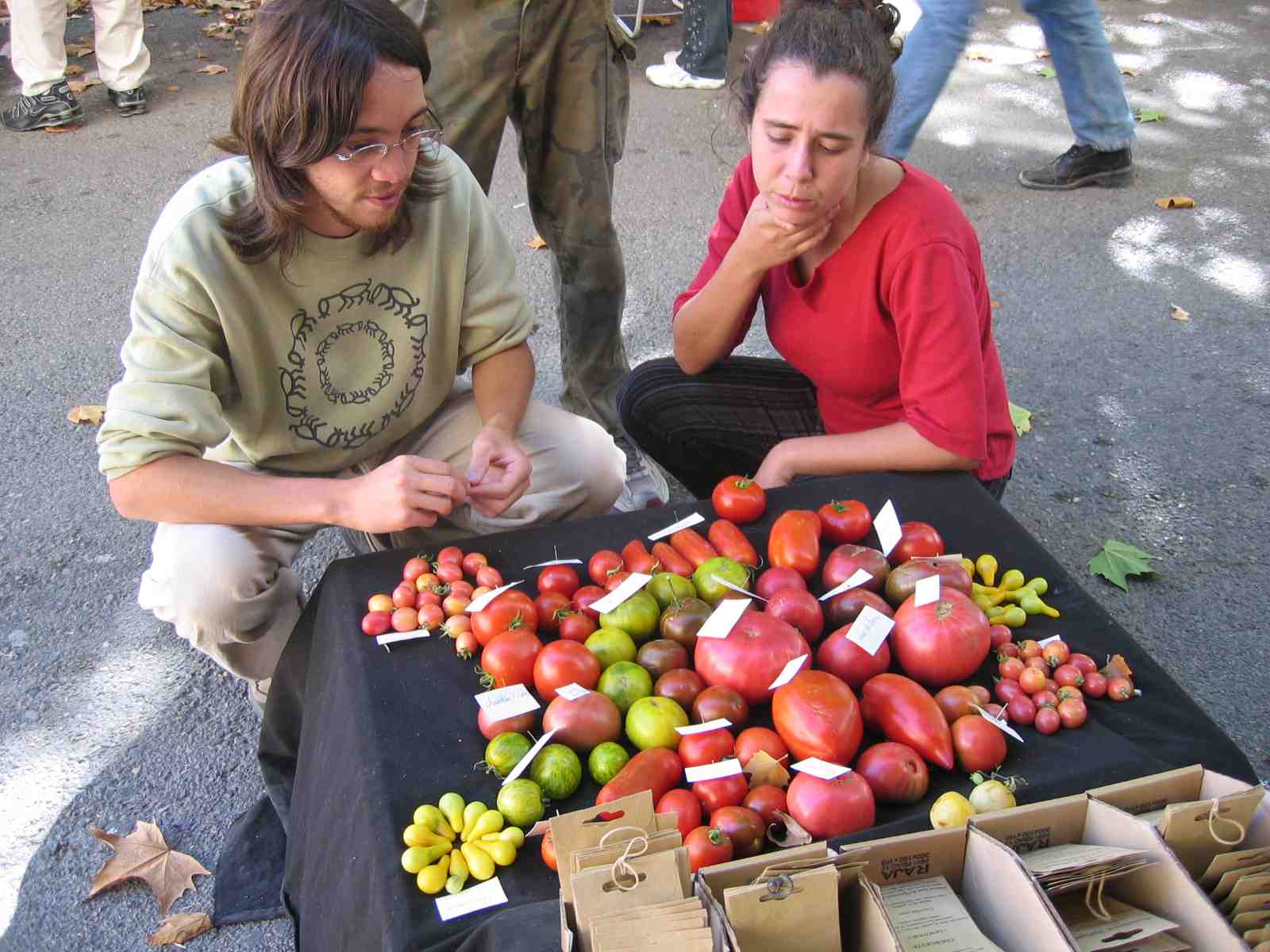
Participants (11-04-2011):
Les jardins de Pomones (Belgium)
Deccan Development Socity (India) – cancelld :(
Irish Seed Savers Association
Kokopelli (Belgium and France)
Gartenbaubetrieb „Akelei“ (Belgium)
„De Godin“ Essbare Landschaften (Netherlands)
Bifurcated Carrots (Netherlands)
Longo Mai (France and Germany)
Scandinavian Seedsavers
Heritage Seed Library (England)
Peliti (Greece)
Schloss Freudenberg (Germany)
Tom Wagner (USA) – table display only!
De Velt (Belgium)
International Coalition for the Protection of the Polish Countryside (ICPPC)
Naturalni (Poland)
„Poland free of GMO”
Keyserlingk Institut (Germany)
Kaiserstühler Gärten (eventuell) (Germany)
From March 25. to 27, 2010, 160 representatives of the European seed networks gathered in Graz, Austira, for the 5th European Seed Meeting “Let’s Liberate Diversity!”. They included groups that work on the conservation, use and distribution of plant diversity, civil society organizations, gardeners, breeders, and men and woman farmers from over 20 countries. (...)
Graz Declaration: Freedom for Diversity
(...)
We demand:
the right to obtain seeds from our own harvest, to re-sow, distribute and sell them;
the promotion of diversity in all regions by supporting conservers and breeders of varieties that can be re-sown;
the prohibition of genetic modofication technologies in agriculture;
the prohibition, without exceptions, of patents on plants and animals, their traits and genes, as well as patents on breeding methods;
a new agrarian policy, which, instead of supporting energy-intensive industrial production and monocultures, promotes biodiverse and ecological production.
These demands are directed toward Member States and the European Institutions.
The participants of the 5th European Meeting in Graz, March 2010.
Crop diversity is the result of human actions all over the world that created it. It is a common good and it belongs to everyone. Access to diversity is fundamental for our daily bread and for achieving food sovereignty. In many regions of the world men and women farmers still continue to produce, exchange, and sell their own seeds.
Seed laws in Europe are to be changed in 2011. The seed industry wants to extends its intellectual property rights and the patenting of crop varieties. It lobbies for stronger control and even the prohibition of farmers' non-registered varieties.
10 companies, among them Bayer, Monsanto, Syngenta and Limagrain, already control 67% of the world seed market. They no longer want to miss out on the rest of the market when they could impose their registered varieties - which usually only thrive with the help of chemical fertilizers, pesticides and irrigation - upon the rest of the world. However, it is not these genetically homogenous industrial seed varieties which will be able to feed the world in the future, but the diverse, regional varieties which are able to adapt to climate change.
The negotiations for the new European seed law are taking place behind closed doors, among representatives of the seed industry and EU bureaucrats. This does not lead us to expect a positive outcome. In order to influence the new seed laws we want to raise public awareness for our goals.
We demand:
the right to produce our seeds from our own harvests, to re-sow and to give them to others;
to encourage regional crop variety by supporting the men and women who keep and breed organic varieties;
to forbid genetic technologies in agriculture;
to exclude patents on plants;
to forbid GMOs and varieties that require intensive chemical use;
to end high energy inputs in agriculture which are the result of monocultures, long transport routes as well as industrial crops that require chemical fertilizers and pesticides.
5th
Meeting
of the European Seed Network
“Let's
liberate diversity"
Graz,
Austria
25 -27 March 2010
Program
